Emin Ibili
Emin Ibili
Visiting Researcher
Emin İBİLİ is an Assistant Professor of the Department of Computer Education and Instructional Technology at Aksaray University in Turkey since 2014. He received his Ph.D. in Computer Education and Instructional Technology from Gazi University in November 2013. He received Master’s degree in Computer Science in 2009. He is a visiting scholar at University of South Australia, School of Information Technology & Mathematical Sciences. His research interests are computer-assisted learning tools, in particular educational augmented reality tools for geometry education. Also his research interests are include Sharable Content Object Reference Model (SCORM) and Internet addiction effects in terms of academic performance and behavior.
Publications
-
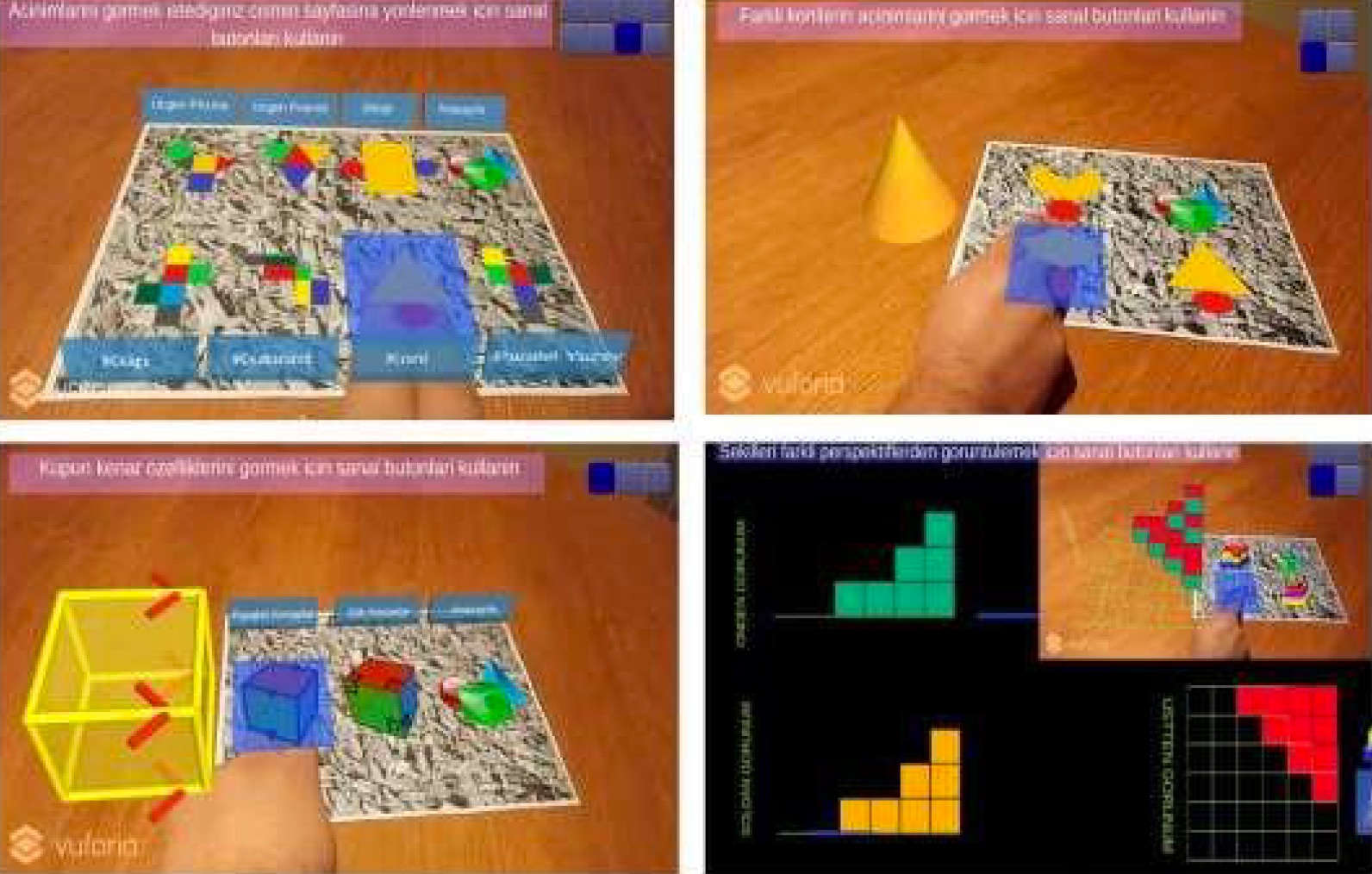
Assessing the Relationship between Cognitive Load and the Usability of a Mobile Augmented Reality Tutorial System: A Study of Gender Effects
E Ibili, M BillinghurstIbili, E., & Billinghurst, M. (2019). Assessing the Relationship between Cognitive Load and the Usability of a Mobile Augmented Reality Tutorial System: A Study of Gender Effects. International Journal of Assessment Tools in Education, 6(3), 378-395.
@article{ibili2019assessing,
title={Assessing the Relationship between Cognitive Load and the Usability of a Mobile Augmented Reality Tutorial System: A Study of Gender Effects},
author={Ibili, Emin and Billinghurst, Mark},
journal={International Journal of Assessment Tools in Education},
volume={6},
number={3},
pages={378--395},
year={2019}
}In this study, the relationship between the usability of a mobile Augmented Reality (AR) tutorial system and cognitive load was examined. In this context, the relationship between perceived usefulness, the perceived ease of use, and the perceived natural interaction factors and intrinsic, extraneous, germane cognitive load were investigated. In addition, the effect of gender on this relationship was investigated. The research results show that there was a strong relationship between the perceived ease of use and the extraneous load in males, and there was a strong relationship between the perceived usefulness and the intrinsic load in females. Both the perceived usefulness and the perceived ease of use had a strong relationship with the germane cognitive load. Moreover, the perceived natural interaction had a strong relationship with the perceived usefulness in females and the perceived ease of use in males. This research will provide significant clues to AR software developers and researchers to help reduce or control cognitive load in the development of AR-based instructional software. -
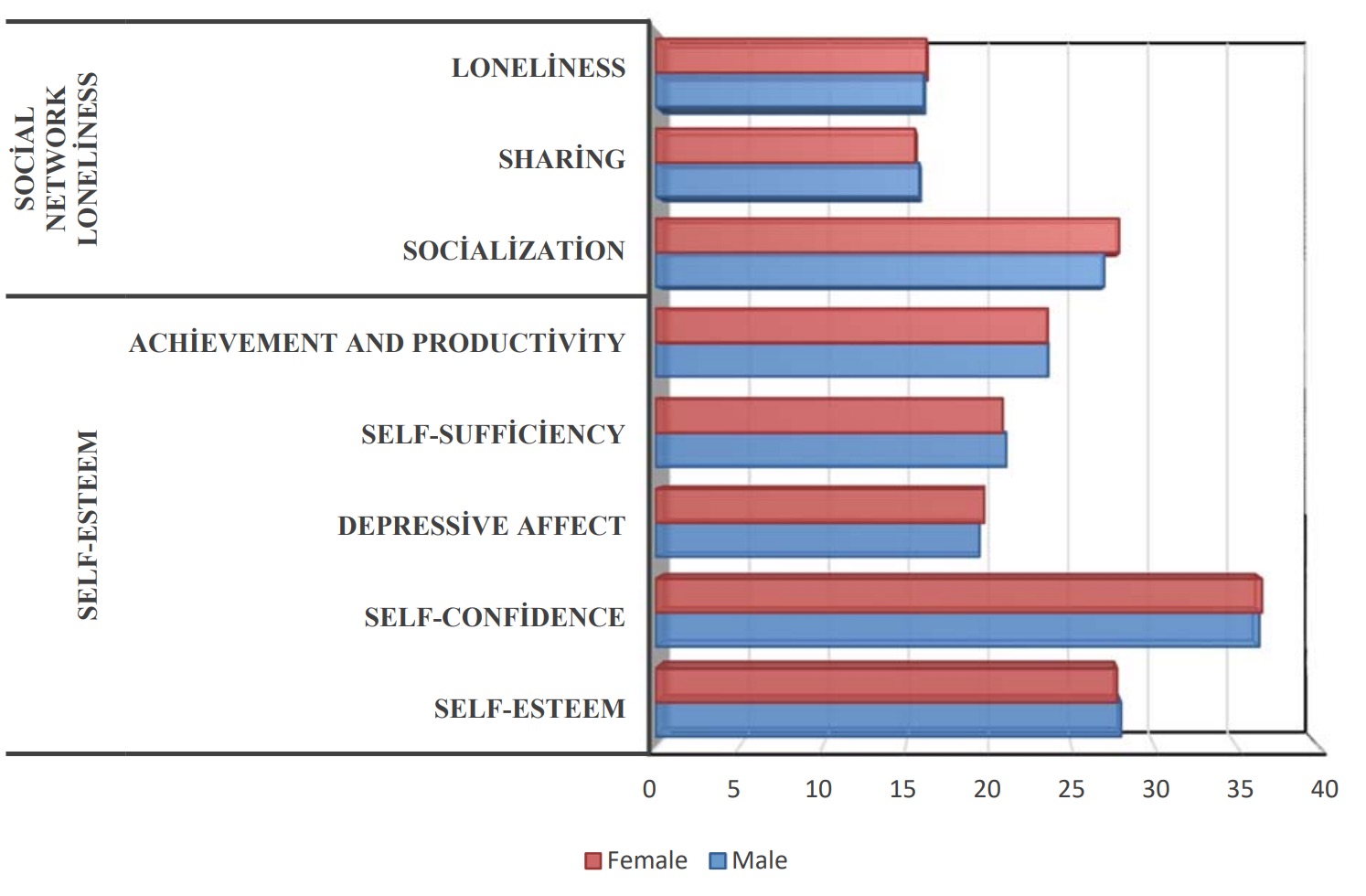
The Relationship between Self-Esteem and Social Network Loneliness: A Study of Trainee School Counsellors.
Ibili, E., & Billinghurst, M.Ibili, E., & Billinghurst, M. (2019). The Relationship between Self-Esteem and Social Network Loneliness: A Study of Trainee School Counsellors. Malaysian Online Journal of Educational Technology, 7(3), 39-56.
@article{ibili2019relationship,
title={The Relationship between Self-Esteem and Social Network Loneliness: A Study of Trainee School Counsellors.},
author={Ibili, Emin and Billinghurst, Mark},
journal={Malaysian Online Journal of Educational Technology},
volume={7},
number={3},
pages={39--56},
year={2019},
publisher={ERIC}
}In this study, the relationship was investigated between self‐esteem and loneliness in social networks among students in a guidance and psychological counselling teaching department. The study was conducted during the 2017‐2018 academic year with 312 trainee school counsellors from Turkey. In terms of data collection, the Social Network Loneliness Scale, and the Self‐esteem Scale were employed, and a statistical analysis of the data was conducted. We found a negative relationship between self‐esteem and loneliness as experienced in social networks, although neither differs according to sex, age and class level. It was also found that those who use the Internet for communication purposes have high levels of loneliness and self‐esteem in social networks. While self‐esteem levels among users of the Internet are high, those who use it to read about or watch the news have high levels of loneliness. No relationship was found between self‐ esteem and social network loneliness levels and among those who use the Internet for playing games. Regular sporting habits were found to have a positive effect on self‐esteem, but no effect on the level of loneliness in social networks. -
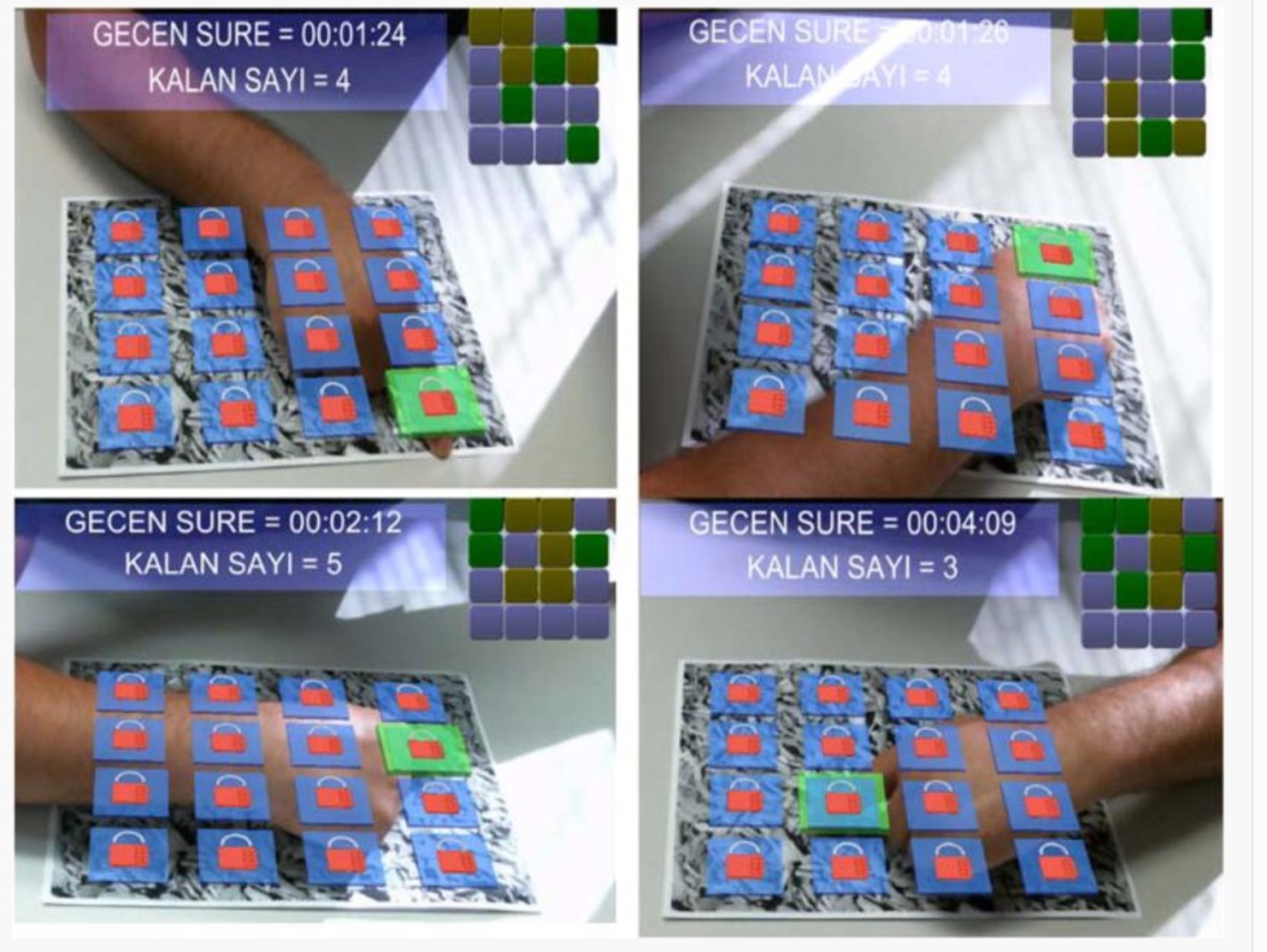
Applying the technology acceptance model to understand maths teachers’ perceptions towards an augmented reality tutoring system
Ibili, E., Resnyansky, D., & Billinghurst, M.Ibili, E., Resnyansky, D., & Billinghurst, M. (2019). Applying the technology acceptance model to understand maths teachers’ perceptions towards an augmented reality tutoring system. Education and Information Technologies, 1-23.
@article{ibili2019applying,
title={Applying the technology acceptance model to understand maths teachers’ perceptions towards an augmented reality tutoring system},
author={Ibili, Emin and Resnyansky, Dmitry and Billinghurst, Mark},
journal={Education and Information Technologies},
pages={1--23},
year={2019},
publisher={Springer}
}This paper examines mathematics teachers’ level of acceptance and intention to use the Augmented Reality Geometry Tutorial System (ARGTS), a mobile Augmented Reality (AR) application developed to enhance students’ 3D geometric thinking skills. ARGTS was shared with mathematics teachers, who were then surveyed using the Technology Acceptance Model (TAM) to understand their acceptance of the technology. We also examined the external variables of Anxiety, Social Norms and Satisfaction. The effect of the teacher’s gender, degree of graduate status and number of years of teaching experience on the subscales of the TAM model were examined. We found that the Perceived Ease of Use (PEU) had a direct effect on the Perceived Usefulness (PU) in accordance with the Technology Acceptance Model (TAM). Both variables together affect Satisfaction (SF), however PEU had no direct effect on Attitude (AT). In addition, while Social Norms (SN) had a direct effect on PU and PEU, there was no direct effect on Behavioural Intention (BI). Anxiety (ANX) had a direct effect on PEU, but no effect on PU and SF. While there was a direct effect of SF on PEU, no direct effect was found on BI. We explain how the results of this study could help improve the understanding of AR acceptance by teachers and provide important guidelines for AR researchers, developers and practitioners. -
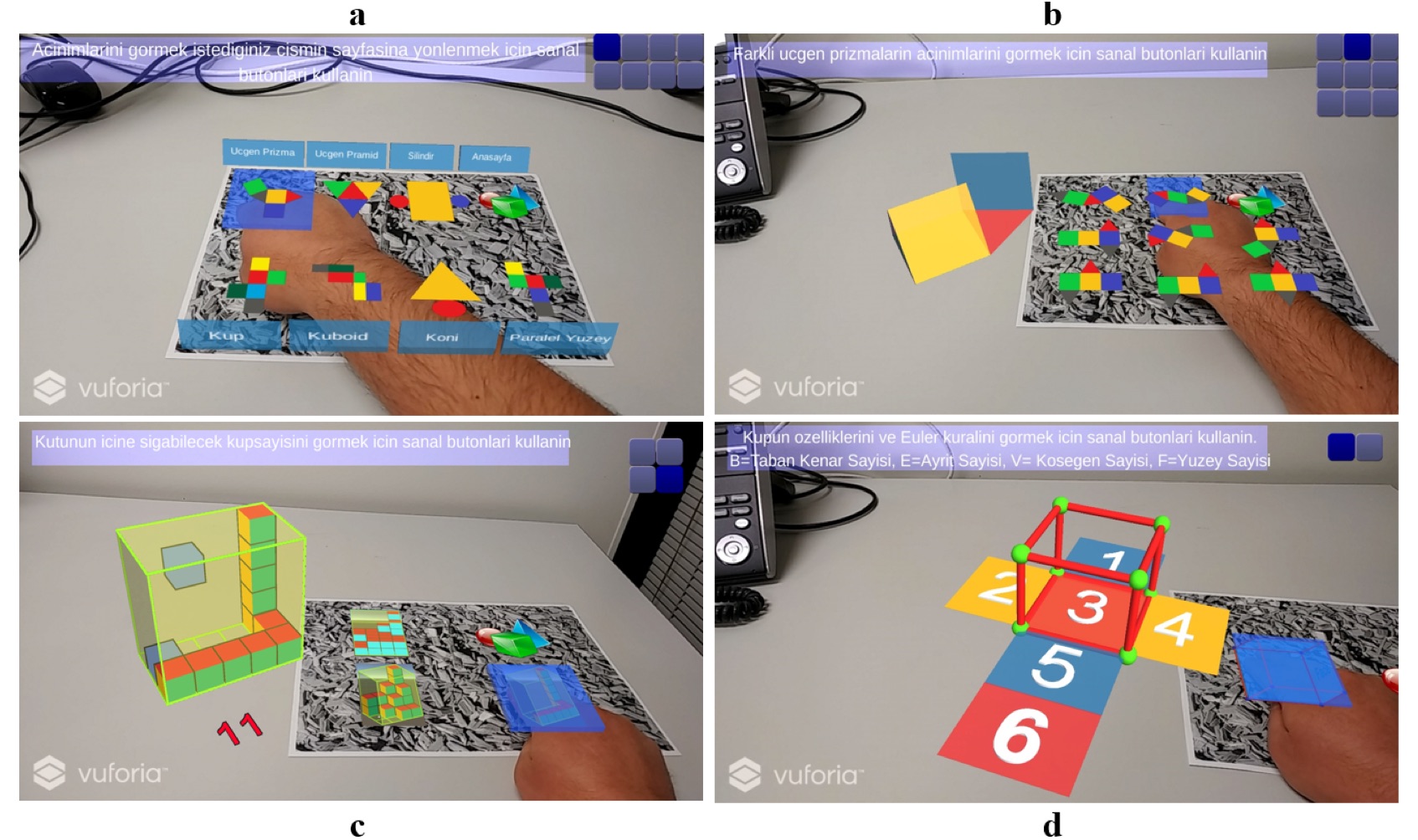
An assessment of geometry teaching supported with augmented reality teaching materials to enhance students’ 3D geometry thinking skills
İbili, E., Çat, M., Resnyansky, D., Şahin, S., & Billinghurst, M.İbili, E., Çat, M., Resnyansky, D., Şahin, S., & Billinghurst, M. (2019). An assessment of geometry teaching supported with augmented reality teaching materials to enhance students’ 3D geometry thinking skills. International Journal of Mathematical Education in Science and Technology, 1-23.
@article{ibili2019assessment,
title={An assessment of geometry teaching supported with augmented reality teaching materials to enhance students’ 3D geometry thinking skills},
author={{\.I}bili, Emin and {\c{C}}at, Mevl{\"u}t and Resnyansky, Dmitry and {\c{S}}ahin, Sami and Billinghurst, Mark},
journal={International Journal of Mathematical Education in Science and Technology},
pages={1--23},
year={2019},
publisher={Taylor \& Francis}
}The aim of this research was to examine the effect of Augmented Reality (AR) supported geometry teaching on students’ 3D thinking skills. This research consisted of 3 steps: (1) developing a 3D thinking ability scale, (ii) design and development of an AR Geometry Tutorial System (ARGTS) and (iii) implementation and assessment of geometry teaching supported with ARGTS. A 3D thinking ability scale was developed and tested with experimental and control groups as a pre- and post-test evaluation. An AR Geometry Tutorial System (ARGTS) and AR teaching materials and environments were developed to enhance 3D thinking skills. A user study with these materials found that geometry teaching supported by ARGTS significantly increased the students’ 3D thinking skills. The increase in average scores of Structuring 3D arrays of cubes and Calculation of the volume and the area of solids thinking skills was not statistically significant (p > 0.05). In terms of other 3D geometric thinking skills’ subfactors of the scale a statistically significant difference was found in favour of the experimental group in pre-test and post-test scores (p < 0.05). The biggest difference was found on ability to recognize and create 3D shapes (p < 0.01).The results of this research are particularly important for identifying individual differences in 3D thinking skills of secondary school students and creating personalized dynamic intelligent learning environments. -
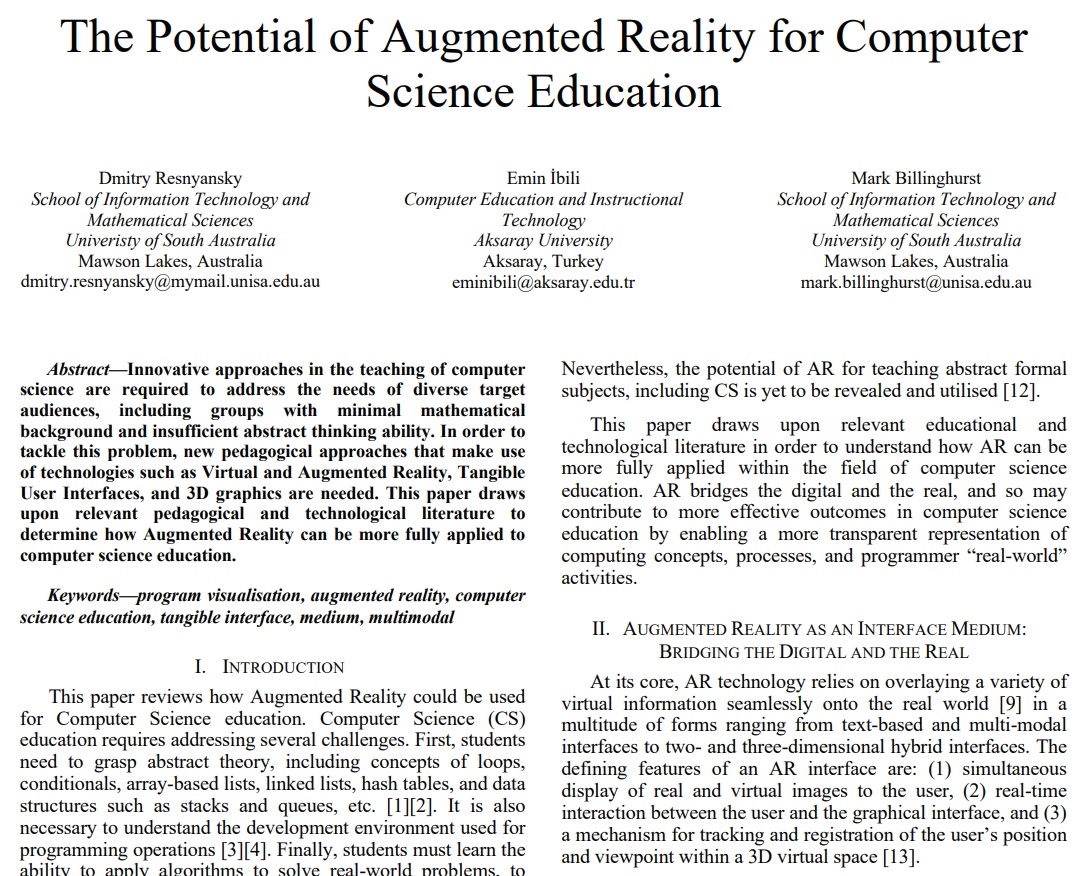
The Potential of Augmented Reality for Computer Science Education
Resnyansky, D., İbili, E., & Billinghurst, M.Resnyansky, D., İbili, E., & Billinghurst, M. (2018, December). The Potential of Augmented Reality for Computer Science Education. In 2018 IEEE International Conference on Teaching, Assessment, and Learning for Engineering (TALE) (pp. 350-356). IEEE.
@inproceedings{resnyansky2018potential,
title={The Potential of Augmented Reality for Computer Science Education},
author={Resnyansky, Dmitry and {\.I}bili, Emin and Billinghurst, Mark},
booktitle={2018 IEEE International Conference on Teaching, Assessment, and Learning for Engineering (TALE)},
pages={350--356},
year={2018},
organization={IEEE}
}Innovative approaches in the teaching of computer science are required to address the needs of diverse target audiences, including groups with minimal mathematical background and insufficient abstract thinking ability. In order to tackle this problem, new pedagogical approaches as needed, such as using new technologies such as Virtual and Augmented Reality, Tangible User Interfaces, and 3D graphics. This paper draws upon relevant pedagogical and technological literature to determine how Augmented Reality can be more fully applied to computer science education. -
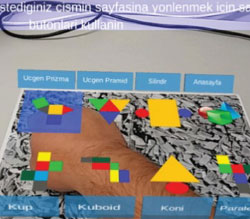
An assessment of geometry teaching supported with augmented reality teaching materials to enhance students’ 3D geometry thinking skills
Emin İbili, Mevlüt Çat, Dmitry Resnyansky, Sami Şahin & Mark Billinghurstİbili, Emin, et al. "An assessment of geometry teaching supported with augmented reality teaching materials to enhance students’ 3D geometry thinking skills." International Journal of Mathematical Education in Science and Technology 51.2 (2020): 224-246.
@article{ibili2020assessment,
title={An assessment of geometry teaching supported with augmented reality teaching materials to enhance students’ 3D geometry thinking skills},
author={{\.I}bili, Emin and {\c{C}}at, Mevl{\"u}t and Resnyansky, Dmitry and {\c{S}}ahin, Sami and Billinghurst, Mark},
journal={International Journal of Mathematical Education in Science and Technology},
volume={51},
number={2},
pages={224--246},
year={2020},
publisher={Taylor \& Francis}
}The aim of this research was to examine the effect of Augmented Reality (AR) supported geometry teaching on students’ 3D thinking skills. This research consisted of 3 steps: (1) developing a 3D thinking ability scale, (ii) design and development of an AR Geometry Tutorial System (ARGTS) and (iii) implementation and assessment of geometry teaching supported with ARGTS. A 3D thinking ability scale was developed and tested with experimental and control groups as a pre- and post-test evaluation. An AR Geometry Tutorial System (ARGTS) and AR teaching materials and environments were developed to enhance 3D thinking skills. A user study with these materials found that geometry teaching supported by ARGTS significantly increased the students’ 3D thinking skills. The increase in average scores of Structuring 3D arrays of cubes and Calculation of the volume and the area of solids thinking skills was not statistically significant (p > 0.05). In terms of other 3D geometric thinking skills’ subfactors of the scale a statistically significant difference was found in favour of the experimental group in pre-test and post-test scores (p < 0.05). The biggest difference was found on ability to recognize and create 3D shapes (p < 0.01).The results of this research are particularly important for identifying individual differences in 3D thinking skills of secondary school students and creating personalized dynamic intelligent learning environments. -
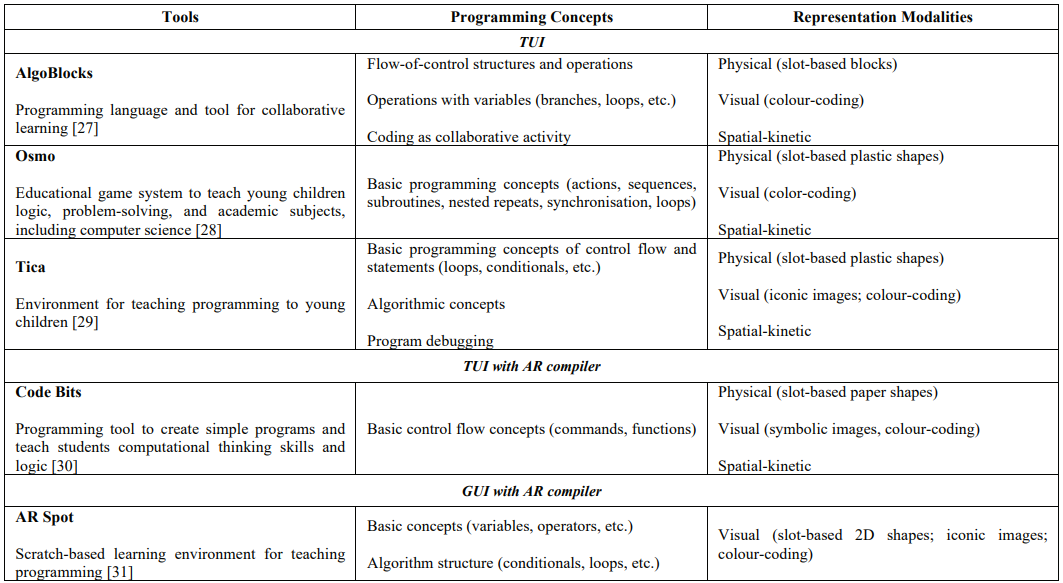
The potential of augmented reality for computer science education
Dmitry Resnyansky; Emin İbili; Mark BillinghurstResnyansky, D., Ibili, E., & Billinghurst, M. (2018, December). The potential of augmented reality for computer science education. In 2018 IEEE International Conference on Teaching, Assessment, and Learning for Engineering (TALE) (pp. 350-356). IEEE.
@INPROCEEDINGS{8615331,
author={Resnyansky, Dmitry and İbili, Emin and Billinghurst, Mark},
booktitle={2018 IEEE International Conference on Teaching, Assessment, and Learning for Engineering (TALE)},
title={The Potential of Augmented Reality for Computer Science Education},
year={2018},
volume={},
number={},
pages={350-356},
doi={10.1109/TALE.2018.8615331}}
Innovative approaches in the teaching of computer science are required to address the needs of diverse target audiences, including groups with minimal mathematical background and insufficient abstract thinking ability. In order to tackle this problem, new pedagogical approaches that make use of technologies such as Virtual and Augmented Reality, Tangible User Interfaces, and 3D graphics are needed. This paper draws upon relevant pedagogical and technological literature to determine how Augmented Reality can be more fully applied to computer science education.

